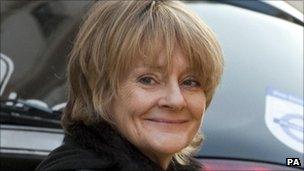Leveson Inquiry: Press watchdog 'made a scapegoat'
- Published

Baroness Buscombe felt she did not have the trust of newspaper editors
The Press Complaints Commission was made a scapegoat over the phone-hacking scandal at the News of the World, the watchdog's former chairman has said.
Baroness Buscombe, who quit last year over the scandal backlash, told the Leveson Inquiry many found it easier to attack the PCC than the press.
Among them, she said, were politicians and the newspapers themselves.
Later, Times editor James Harding apologised for a journalist hacking into an anonymous blogger's emails.
'Regret'
During Baroness Buscombe's two years in the post, she said she lost trust in editors and felt they had not told her the truth.
"I had to question the editors on the PCC in my head. It was very difficult. These were editors I had worked with," she added.
"I want to support a self-regulatory system because I believe there's a real problem with the alternative, ie. state regulation, but this demands a degree of trust."
She went on to voice concerns the Newspaper Publishers' Association and the Newspaper Society had been "silent" throughout the scandal, yet should have been acting as "overarching" bodies.
Asked about the PCC's own investigation into phone-hacking allegations, Baroness Buscombe said she regretted being misled by News International and taking what police told her "on trust".
"We were terribly constrained on this," she said. The PCC could not investigate what was a criminal act, and people were misconstruing our role, she told the hearing.
On taking up her role in April 2009, she wanted to make changes in remit, sanctions and funding, but she met resistance from the industry, the hearing was told.
She added that one of the PCC's roles of requiring newspapers to publish critical adjudications for mistakes and code breaches had a "massive" effect and "really hurts".
At stages, the Financial Times, the Guardian and the Mirror had all threatened to leave the PCC over such adjudications, she said.
However the FT has disputed the claim, telling BBC News: "The FT has never complained to the PCC about adverse adjudications nor has it ever threatened to leave the PCC because of rulings against the newspaper."
The Mirror also denied the claim, saying: "The Mirror has not threatened to leave the PCC in recent years."
James Harding: "I sorely regret this intrusion"
Times editor James Harding, appearing for a second time, apologised to the Lancashire detective Richard Horton, whose emails were accessed in 2009 by a Times journalist.
The reporter had been trying to unmask him as the author of the anonymous NightJack blog.
Harding said: "I sorely regret the intrusion into Mr Horton's email account by a journalist.
"People expect better of the Times, and so do I. On behalf of the paper, I apologise."
Previously, the inquiry has heard the Times fought a High Court battle to name Mr Horton as the writer of the blog after the reporter told his managers he had tried to access an email account.
Harding said if he had been told the email account had been hacked into, the journalist would have faced disciplinary action and the story abandoned.
"I would have said that the intrusion was not warranted in the public interest. But he didn't come to me."
Earlier in the hearing, Lord Justice Leveson said he would recall Daily Mail editor Paul Dacre to face more questions on accusations by actor Hugh Grant.
Previously, Dacre accused Grant of making "mendacious smears" after he claimed a Mail on Sunday story came from illicit eavesdropping.
On Monday, Dacre said he knew of no cases of phone hacking at the Mail.
Dacre, also editor-in-chief of Associated Newspapers, publishers of the Mail and the Mail on Sunday, said he would withdraw the "smears" statement if Grant withdrew his claims the Daily Mail or Mail on Sunday were involved in phone hacking.
Dacre is expected to return for no more than 30 minutes of questioning later this week.
Dominic Mohan, the Sun's editor, recalled to give further evidence, was asked about stories involving celebrities, including Martine McCutcheon and the Spice Girls from when he was editor of the showbusiness pages, Bizarre.
He was questioned about whether the expression "bombarded with phone calls" indicated the story was a result of phone hacking.
Mohan told the inquiry he could not be 100% sure they were not but he was not aware that illegally accessing voicemails were the source of any of these stories.
He also defended publishing pictures of topless models on page three saying it was a "42-year-old British institution that celebrates natural beauty" and "part of British society".
The models were good role models and very healthy, unlike "stick thin" catwalk models, he added.
Others giving evidence include Ronald Zink, of Bing, Neil Turner, of the BPPA, and Colin Crowell, from Twitter.
Mr Crowell, head of global public policy at the microblogging service said Twitter serves a billion tweets every four days and, if compelled to, it would hand over the personal information of people breaking injunctions.
- Published7 February 2012